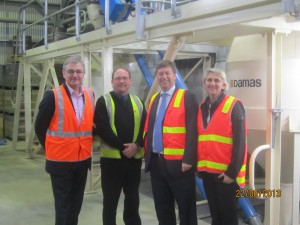25th June 2012
Blood and opium in Tasmania
Nestling amidst the verdant farmlands of northern Tasmania, I saw British companies engaged in fascinating high tech businesses linked to agriculture. Around half the world’s legitimate opiates are produced in Tasmania, half of them by UK pharma giant GSK. They process poppies grown by some 400 farms around the island, which go on to become the basis for many important global medicines. It is a very R&D oriented business, as new plant varieties are constantly being developed to produce increasingly sophisticated alkaloids.

The business was set up here in the 1960s when the UK needed to find secure alternatives to production in other parts of the world. It has become a significant contributor to Tasmania’s economy. Nothing is wasted: the poppy seeds which are a by-product are sold into the catering industry. When you tuck into a lemon and poppy seed muffin anywhere in the world, the chances are the seeds came from GSK in Tasmania. My only disappointment was to learn that these poppies are all white, rather than the red ones we associate with Poppy Day in the UK.
A much smaller niche enterprise, Selborne Biological, which takes its name from the Hampshire town where its HQ is located, produces serum and proteins for the medical and veterinary industries. Its charismatic founder, Neville Pope, showed us round their state of the art high tech clean rooms and described how they own local farms with large herds of sheep and cattle, and shortly even a few camels. They also buy all the blood from Tasmania’s abattoirs to extract useful serum.
I also had the chance to discuss economic trends in Tasmania with Premier Lara Giddings and with the Launceston Chamber of Commerce. The island lags the more booming mainland states, and benefits from significant fiscal transfers from the federal government. But it has a number of important niche strengths, not least in Agriculture.